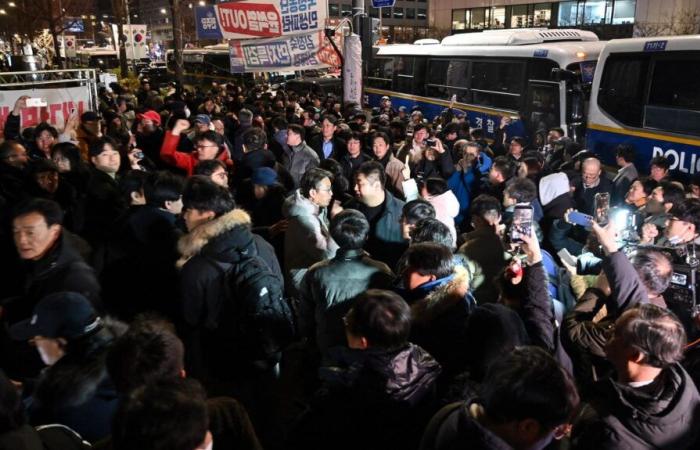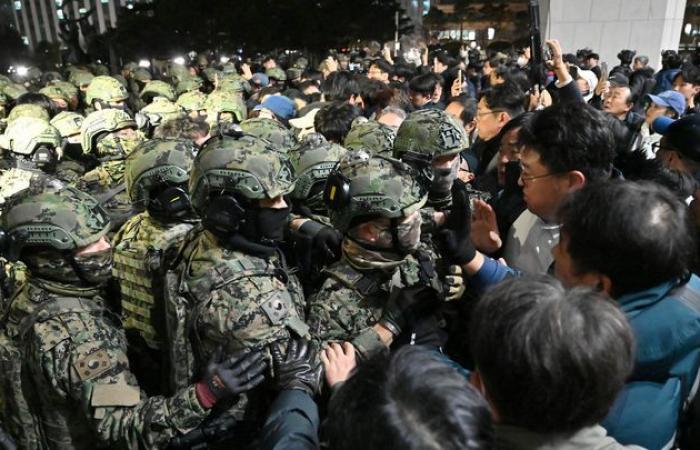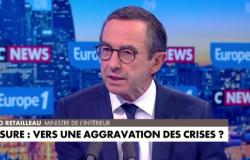A first since the end of the military dictatorship in 1980. The President of South Korea, Yoon Suk-yeol, proclaimed martial law in his country on Tuesday, December 3, banning all political activity and placing the press under control. of the army. Less than three hours after its announcement, the majority of deputies voted against this measure and the vote was validated by the president of Parliament, reversing the decision taken by Yoon Suk-yeol. What happened? Why did the president declare martial law? How did the population react? Franceinfo answers four questions about this new episode.
1 Why was martial law declared?
In surprise televised address, South Korean president proclaimed martial law and said he would make the decision “to protect liberal South Korea from threats posed by North Korean communist forces and eliminate elements hostile to the state”in reference to the elected representatives of the opposition. The president's party, People Power, is currently engaged in a standoff with its opponents in Democratic Party on next year's proposed budget.
Last week, opposition MPs approved a significantly reduced budget package. Yoon Suk-yeol accused the Democratic Party of cutting “all budgets essential to the primary functions of the nation, (…) transforming the country into a drug paradise and a place of chaos for public security”. According to him, the South Korean National Assembly would be “become a refuge for criminals, a den of legislative dictatorship which seeks to paralyze the administrative and judicial systems and overthrow our liberal democratic order”.
2 How did the deputies respond?
The Democratic Party asked all its members to gather for an emergency meeting, following President Yoon Suk-yeol's announcement. This formation, which won the last legislative elections in the spring, has 170 of the 300 seats in the National Assembly, the only chamber of Parliament. The 190 South Korean deputies present adopted a text to block martial law. A vote validated by the President of Parliament, making this very brief legislation obsolete. According to the Constitution, “the president must immediately inform the National Assembly of the declaration of martial law and if the National Assembly requests its cancellation with the majority of votes of elected officials, the president must lift it”recalls the Yohnap press agency.
Before the vote, Democratic Party leader Lee Jae-myung called on people to gather in front of Parliament in protest. “President Yoon Suk-yeol’s illegal imposition of martial law is invalid”said the one who narrowly lost to the president-elect in the 2022 elections. “Come to the National Assembly now. I’m going there too”he added.
3How did the population react?
Hundreds of people flocked to Parliament on Wednesday morning to protest against martial law and the restrictions it entailed, according to images broadcast live on television. The decree prohibited all demonstrations, political activities, strikes, and ordered the placement of all media under military control, according to the translation of the text published by Yohnap.

“Open the door, please. Your job is to protect the National Assembly. Why are you standing idly by while MPs are trampled?”shouted a man to a group of police officers guarding the doors of the establishment, which was placed under seal. One MP told the BBC he had to climb over a fence to enter the Assembly because police blocked him, even with ID proof of his mandate.
According to the Korean newspaper Chosun Ilbocitizens waiting in front of the building applauded the announcement of the deputies' vote. The slogans “Long live the Republic of Korea!” et “Yoon Suk-yeol, resign!” sounded.
Members of South Korean special forces tried to enter Parliament, according to broadcast images. After invalidating martial law, the President of the National Assembly announced that the army present in the building was withdrawing. The latter nevertheless declared that she “would enforce martial law until lifted by the president.”
4 What does the international community say about it?
The United States shared its “worry” about the situation in South Korea, and says he hopes for an outcome that respects “the rule of law”, after the proclamation of martial law. “We are closely monitoring developments in South Korea,” assured a spokesperson for British Prime Minister Keir Starmer, while the Ministry of Foreign Affairs called on United Kingdom nationals to “follow the advice of local authorities and avoid political demonstrations”.
The Chinese embassy in South Korea called on its citizens in the country to “prudence”. She advises them “to remain calm, increase their security vigilance, limit unnecessary outings and exercise caution when expressing political opinions”.
A little later, a UN spokesperson said that the United Nations was following “with concern” the situation in South Korea.







